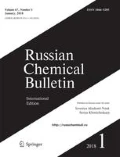Conclusions
It was shown that the catalytic synthesis of the methyl ester of formic acid can be accomplished by the reaction of CO2, H2, and CH3OH in the presence of complexes of the transition metals.
Literature cited
A. Misono, Y. Uchida, M. Hidai, and T. Kuse, Chem. Commun., 981 (1968).
L. S. Pu, A. Yamamoto, and S. Ikeda, J. Am. Chem. Soc.,90, 3896 (1968).
I. S. Kolomnikov, T. S. Lobeeva, and M. E. Vol'pin, Izv. Akad. Nauk SSSR, Ser. Khim., 2650 (1970).
P. Haynes, L. H. Slaugh, and J. F. Kohnle, Tetrahedron Lett., 365 (1970).
Author information
Authors and Affiliations
Additional information
Translated from Izvestiya Akademii Nauk SSSR, Seriya Khimicheskaya, No. 10, pp. 2329–2330, October, 1972.
Rights and permissions
About this article
Cite this article
Kolornnikov, I.S., Lobeeva, T.S. & Vol'pin, M.E. Reduction of carbon dioxide by molecular hydrogen in the presence of complexes of the transition metals. Russ Chem Bull 21, 2263–2264 (1972). https://doi.org/10.1007/BF00855315
Received:
Issue Date:
DOI: https://doi.org/10.1007/BF00855315

